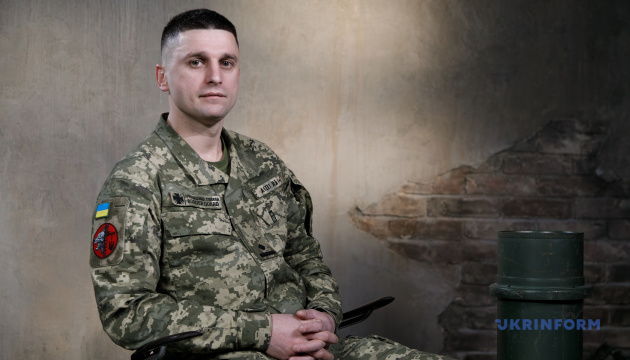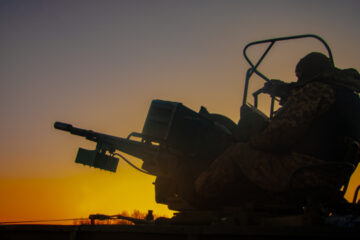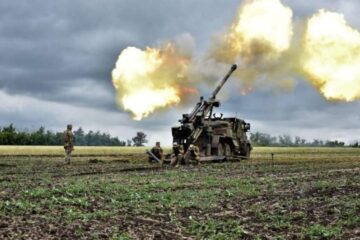Dmytro “Coyote” Polonchak was serving as part of the State Border Guard Service of Ukraine for over ten years. After February 22, 2024, he stood up for defense of Ukraine’s sovereignty and joined the ranks of a combat unit, which was the reconnaissance subunit of the border guard commandant’s office Shkval (‘Storm’). As part of the unit, Coyote partook in combat operations in the Chornobyl exclusion zone, in the East of Ukraine and in the very center of Bakhmut. He and his comrades had endured enemy’s attack while being fully encircled and, despite everything, managed to come out alive. In this new Victory Commanders series interview, Ukrinform sat down with Dmytro Polonchak to talk about his role in the battles in the Chornobyl exclusion zone, amidst radiation hazards, the battles of Bakhmut fighting against Wagner forces, the exit from the encirclement, about work in his current position, where Coyote has to deal with draft evaders, both living and dead.
[embedded content]
– You served as a border guard for longer than ten years before the full-scale invasion began. What were your first actions on the morning of February 24?
– Well, first, of course, it came as a shock, like, I think, to all the people, and then I called my commander about what we are supposed to do. The commander made a decision that we should come together at a particular deployment site in the Lviv region and wait for further tasks. We knew that this was a unit that will be the first to be assigned tasks, assigned to depart for a certain location to defend the country.
– The border guard’s service at times of peace is completely different. Were you prepared to face the fact that you’ll have to defend the state border in this way?
– Our contracts specify protection of state sovereignty and territorial integrity to be our key responsibilities. So we were fulfilling our duties. Regarding other matters, the deployment site was not specified – it was the Bakhmut city administration, in a terrible state. We pass by it after completing the task – and here a comrade of mine tells me: this was not written in my contract. I don’t remember what he said exactly. And at a later time, these clear words that flew around (or, rather, he said, if memory serves right, he said ‘kill the Russians’) – this is the best contract in the world. Well, this is what the meme went from: the best job in the world and the best contract in the world.
– What was the duty station you were transferred to at the beginning of the full-scale invasion?
– At the beginning, after our phone calls with comrades, I was transferred during half a day (the issue was resolved within a matter of hours) to the Lviv region, to a certain deployment site. I won’t name it. We were recruited from all the cities of the country.
– What unit was it part of, what made it specific?
– This was a subunit of Shkval Rapid Response Commandant’s Office. It is specific in that this unit is intended to do stabilization measures or repair some negative developments on the border. As we all remember: the Hasidim were coming in en masse, and the unit was assigned to go there to stabilize the situation. Where assigned to a war zone, it is the first to go there to halt the enemy’s advance, to prevent them from crossing over the state border line, for example. Afterwards, all the armed services, the Armed Forces were getting engaged, depending on the level of the treat, I would say so.
– That is, it is that force that is supposed to be the first to respond promptly to threats emerging in the hottest spots?
– Exactly so. We even had been continuously trained for this, well, you know, the “alarm bags”, weapons were with us most of the time. We were supposed to get ready within five minutes to board on vehicles, already fueled, and leave.
– How long did it take to respond?
– From the time a command arrives, it sufficed half an hour for me and the guys to pack up and board on vehicles.
– Fully combat ready?
– Fully combat ready, fully loaded with weapons and ammunition supply.
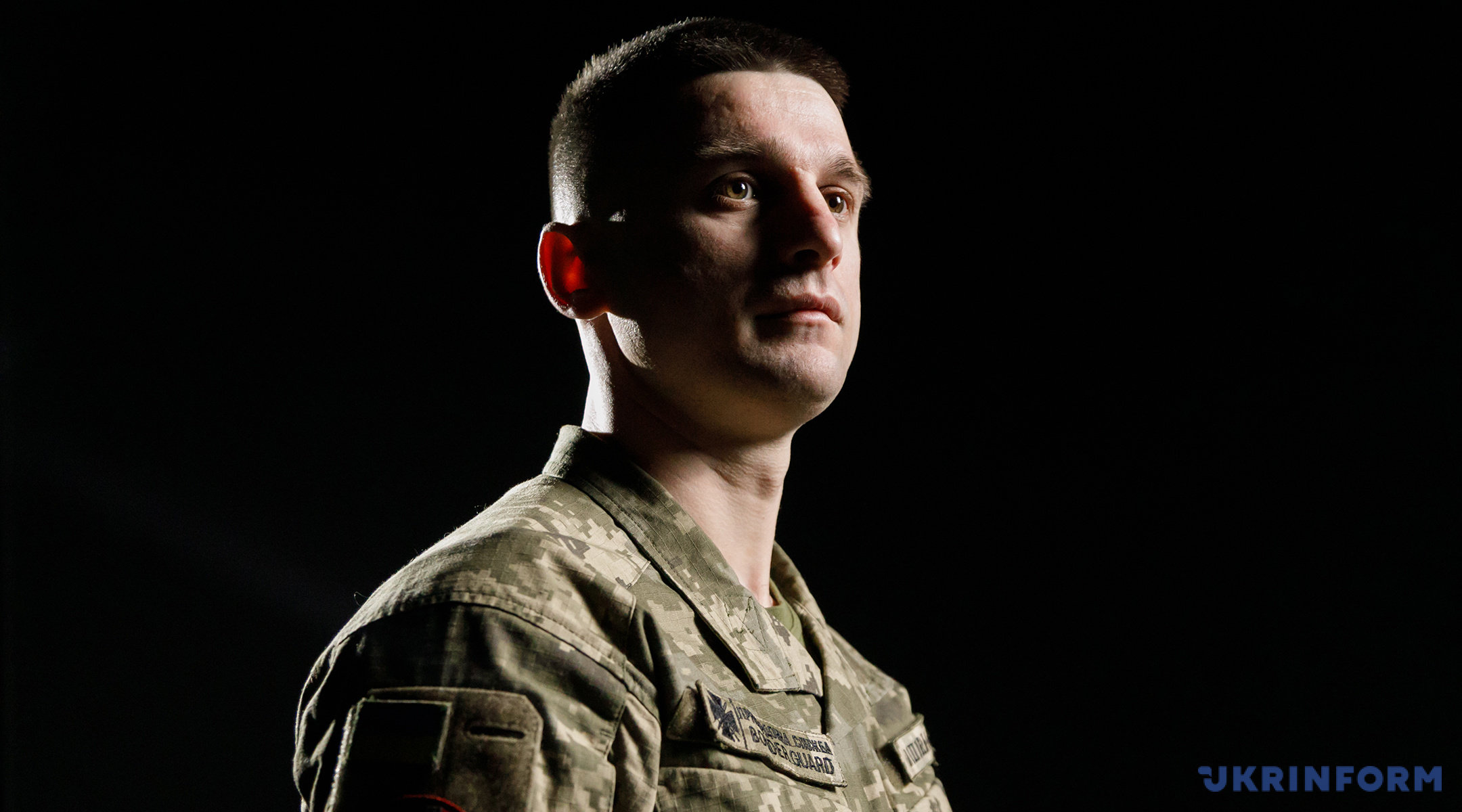
– Do you remember your first combat mission, what were the emotions like?
– Our first mission was to bring people to the Chornobyl exclusion zone, in the Kyiv region. We departed, the advance party, and we were told: you have to accommodate people in that area (I won’t say how many thousands of people there were, but well, there were quite a lot of them). And so we arrive. We all are familiar with the central roadway, the one the enemy used to advance to the Kyiv region through the Chornobyl zone, the entrance to the Chornobyl zone. The bridges there were blown up after the enemy had retreated from the area. And we needed to accommodate the personnel and immediately clear the territory of mines, take up defense right on the state border between Ukraine and Belarus.
– What does it mean to accommodate people?
– To accommodate people means to find a suitable location, conduct an analysis, an analysis of the enemy’s potential movements, to deploy people in a certain direction, where they will dig in, set up a line of defense. The defense line consists of dugouts, trenches, evacuation routes, logistical routes to deliver ammunition and other supplies. This involves a comprehensive set of measures, Back then, I, a border guard, had no idea of how such comprehensive measures could be planned that carefully and how to directly occupy and defend the area that was assigned to us. We did not choose the area by ourselves, because for this there are the highest-ranking commanders who set certain tasks for certain directions.
– When you entered the Chornobyl zone, what was the situation like back then, and how did events unfold further?
– No one had an understanding of what was going on — a concise, clear and high-quality understanding. We received information from everywhere: through the media, from commanders. You may remember that, before the war, all service members were wearing different uniforms, there were no differentiating bandages back then. The volunteers gave us a vehicle, and we stuck the flag of Ukraine on the hood – stuck it with ribbons, duct tape, signaling that we are ours, don’t touch us, like, we are ours, don’t touch ours. And there was a lot of tension because you didn’t clearly understand the task facing us at that time. Back then I was driving, with a lieutenant colonel on the front passenger seat, two majors and a captain on rear seats, and you constantly keep a KS assault rifle folded, a cartridge in the chamber, the safety disengaged, the barrel turned towards the door. If stopped at checkpoints – there were lots of them and some were hard to identify if they are authorized or unauthorized — you just had to pull the trigger and discharge a burst of bullets, through the door, at the person who was checking you.
– Did the mission succeed?
– The mission was fully completed. We set up the defense line, dug in, fully blockaded the enemy’s paths, cleared the mined territories of mines, took up defense and waited for further combat orders.
– How did you choose where to dig in, considering that this was the Chornobyl exclusion zone?
– We were deployed in the Red Forest area where the Russians dug in, where the radiation meter was beeping very loudly, warning about extremely high radiation levels. Indeed, we chose the locations that were suitable for defense. Where an area is contaminated with radiation, the contamination is spotted. We changed people more often and, in addition, in the winter period, everything needed for heating was brought in, the firewood was brought from the rear regions of Ukraine.
– How did you wash yourself in those conditions?
– At that time, volunteers gave us a wheeled bathhouse, it traveled with us. Basically, there were no problems with this. The volunteers helped us a lot, they gave us everything they could to enable us to defend our country.
– What did the Russians leave behind in the Chornobyl exclusion zone?
– They planted mines everywhere: railway crossings, buildings, border guard stations… They were looking for ties between border guards and local people. If they found a border guard’s beret somewhere – that was like, come up here, where is the man, he must be serving now. At that time, they used 5.45 mm rounds without markings on the bottom of the cartridge case. There were no markings, as we usually see, showing what kind of cartridge it was: the caliber (5.45 x 39 mm), the year of manufacture, batch number, the cartridges were completely unmarked, unlabeled, never before had I seen this thing.
– What can this suggest about their intentions?
– This suggests that, in my opinion, they probably did not expect the war would be long-lasting, that is, they thought that they would scare us, that we would change our flags, the war would end there and they would go their own way. And they were performing their missions, used the bullets that we found there.
– Didn’t the Russians understand where they were going?
– I think they didn’t. And some in their vehicles were engaged in looting…
– What did they loot, try to steal from Chornobyl zone?
– They grabbed everything they saw, everything their hands could reach, to be honest. We questioned the locals – everything in a row when they entered our villages.
– Did they come to houses accommodating shift workers?
– They came everywhere. Somewhere they stole a cow, somewhere they came to an old woman, they took away a refrigerator full of meat. Whoever had a plasma TV hanging on the wall, they took it away, were stealing jewelry from the residencies. People were saying that they had to hide everything which they could have been killed for. Do you remember people going to Pripyat to take pictures of these huge, meter-long catfish? Now just one single catfish has left — there were some four of them. The workers recalled that the Russians ate two. They shot them with an automatic rifle before pulling them out and having ate them. In our country, this is a culture, an animal is an object of culture which people went to look at, threw bread at, took pictures of, and filmed videos. The Russians did not leave anything good behind.
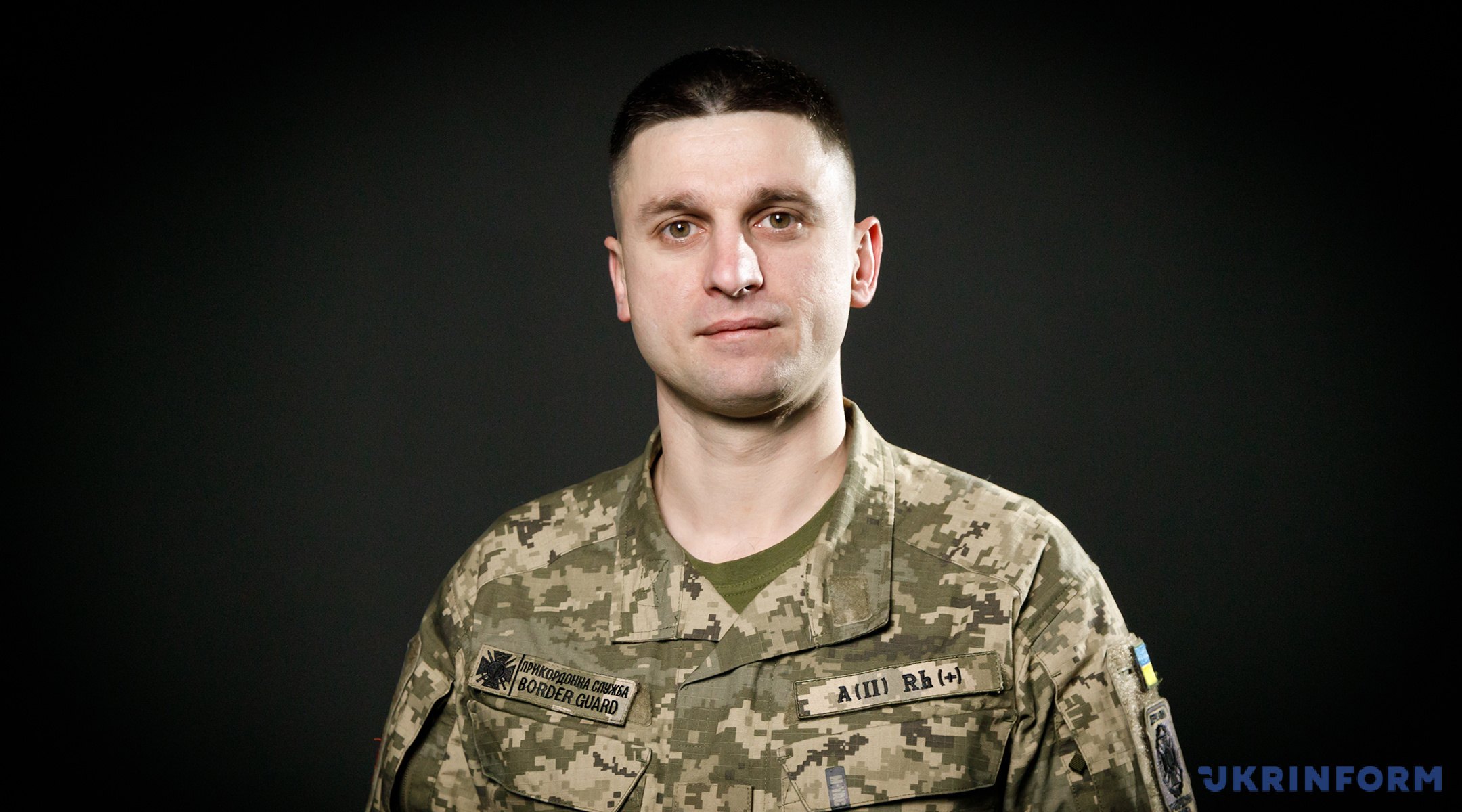
– Afterwards, you went to the Eastern Front, took part in the battle of Bakhmut, which is ranked among the most crucial ones in modern Ukrainian history. What was this battle like for you?
– We had already been to the Eastern Front, knew what it is like to come under fire, come under shooting. We were lucky not to be sent to fight in the hottest war area right away, but were allowed to get adapted, like stay here for a while, then move there…
– Before Bakhmut, you are known to have fought on the Lyman Front…
– Yes, the Lyman direction. We didn’t know the exact destination we were moving to, knew that it should be Bakhmut, but not the city proper, maybe a location somewhere nearby, but ended up right in the city. And guess again how we got there? The advance party, which would drag everyone else, to look for basements. We then found a perfect basement, everyone envied us: the basement at a non-ferrous metals factory, a bunker, it was the first time I had seen such a thing, there were doors there, like Hitler’s, you know, that locked. We got there, then we were gradually inducted into the process, and here we were assigned the central direction, reserved specifically for the border guards. I was so much surprised at the fact that border guards were assigned the central direction of defense…
– This was the city center, right?
– Yes, the central direction. It was a very challenging task assigned to us, we understood that everyone wanted to hold the center, everyone wanted to advance there.
– What further tasks did you face?
– Preventing the enemy from advancing. We analyzed the locations of our units, did the calculation of the forces and capabilities on the ground, coordinated our actions with other units, because there were many units deployed in the same central direction, not just border guards.
– How did you cope with the responsibility of making decisions, giving orders, and was there the one that was difficult to give?
– To be honest, I was receiving lots of instructions, conducted analysis. Why was it easy for me to conduct analysis? This was because I was alongside my guys in positions, that is, you don’t sit in the back looking at the battlefield picture from a reconnaissance copter only, like it displays it to you, and you make decisions. Instead, you are at the front edge alongside your guys, you are fighting alongside the guys, and then you are assigned a task and you say: no, guys, it won’t happen like that. And why it won’t happen like that – that’s my question. There’s the second floor, the ceiling has fallen, the premises becomes completely unsheltered, who will hold the defense there, there’s no such thing there, coordination, for example. Certain questions arise, I say: resolve these questions. If everything is okay, well, we will be eager to fulfil this task.
– Is that to say that you defended your views and position?
– Yes, I had my own position and view, the guys loved me very much for this, but some didn’t because of these questions. But you are a personality, you won’t be good for everyone, but you give suggestions, and smart officers always heed to others’ opinions. Where I am requested to offer my vision, asked about my opinion, we then sit down together, agree on a plan, then I liked it, then they listened to you, it’s not for nothing that you run there alongside the guys, they listen to you, conduct an analysis, and you assist in making decisions.
– So, you succeeded in finding an understanding?
– Yes, sometimes it was a little bit difficult, sometimes it was easy, but an understanding was always found.
– What’s your assessment of the battle of Bakhmut? If you had the opportunity to change something, what would you change?
– Basically, it was the most difficult battle back then, the most difficult decisions had to be made, because the lives of your guys depended on each decision – it’s very difficult when lives depend on it. At that time, the copter warfare was just developing, monitoring was carried out with copters, which were deployed intensively, large agricultural copters were already used for dropping mines. But the artillery simply eliminated everything. Here is the line of battle, the buffer zone between us and the Russians, the middle was simply devastated, or burning, or cracking, there was no living space left there, I have never seen anything like that, for example. The amount of the enemy’s artillery consumption was enormous, and ours was similarly large, but they, as I understand it, had much more artillery available to them at that time. Now, you see, the tactics of war waging has changed a little due to first person view (FPV) drones. Previously, FPV drones were suppressed with jammers, and now, you see, they are wire-controlled, making them no longer suppressable with anything. Everyone is always improving, not only us, but the enemy as well. The enemy cannot be underestimated in their actions, we need to study their tactics and look for solutions to counteract this tactics or use the enemy’s tactics against them.
– What can we use against them, what kind of tactics?
– For example, I really liked one thing when I was already engaged in sniping. I wasn’t serving as a sniper back then, just had my rifle lying on the shelf. Since it’s lying on the shelf, it needs to be made use of somehow. An [enemy] sniper was causing us much trouble. The guys are constantly reporting over the radio that they are in trouble, trouble, trouble, someone sustained a wound, they can’t deliver ammunition supplies, can’t deliver food to the position, inquiring what to do with this, troubles are everywhere. And then we went crazy, found out his location, found him, eliminated him. Even though not a sniper myself actually, I was already walking like a Terminator, just couldn’t wait to shoot the rifle. So we had eliminated him, and then it somehow gave us an impetus to do whatever we want, we used lots of different weapons. Want a DShK [heavy machine gun]? No problem, here it is! We deploy it on the nineth floor, on a nine-level building, this DShK, and start firing at the enemy.
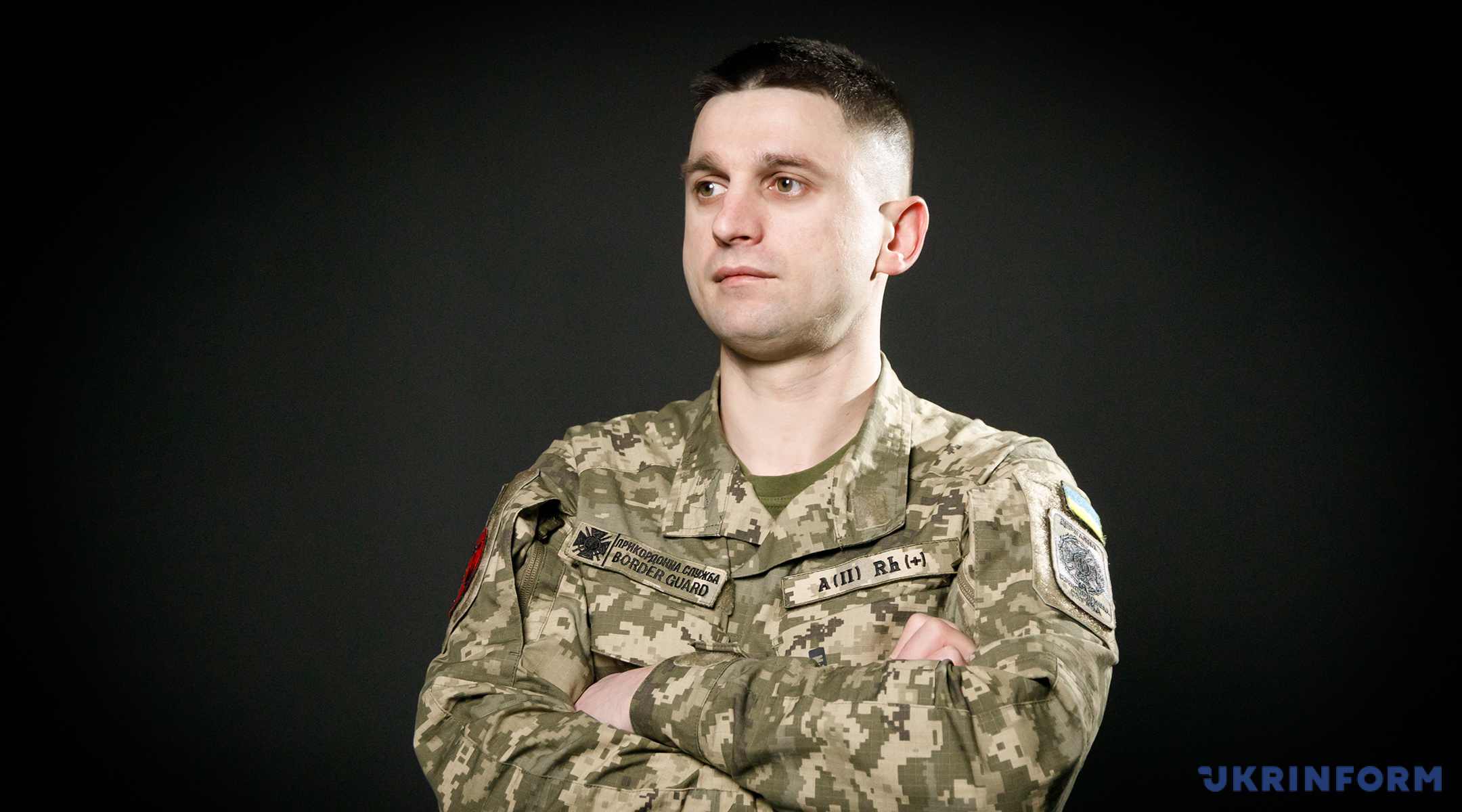
– So it turns out that you became a sniper by accident?
– By accident, really.
– In this interview, you have already listed so many different responsibilities that were assigned to you: demining and sniper missions among them… How did you learn it that fast?
– There was a small team of guys who were thirsty for the action, let’s call it so. And we used this action in many different directions. When we saw the Russians walking at just 300 meters from us, for example, we started sniping at them, killed a couple of them, wow, they already start running at a kilometer away, and here they don’t walk calmly at all, they run like crazy so as to avoid being hit. We understand that there are already fewer targets, so we do like his: the vehicles stop calmly at 1,500 meters, the personnel disembark, we deploy the anti-tank guided missile system, now the anti-tank guided missile launcher fires far away, we shoot at the vehicles with the anti-tank guided missiles, oops, the vehicles ceased to drive anywhere closer, bringing in personnel. Then they shelter in a hut, for example, they leave the hut now and again. So, what do we have lying around in the armory? An anti-tank guided missile launcher? Great! Let’s load it with a missile, this ATGM. We had one anti-tank gunner, call signed Milkiy (‘small’ or ‘young’), he is so small, the ATGM was bigger than he was. He loads it, sorry, with not an ATGM missile, but with a 28-lb Fagot missile, to be correct, launches it, and bang – the hut is finished off by the missile!
– Was that effective?
– Where you are in command of a particular area and want to achieve something, you give the guys the freedom to succeed. At times, it is more effective.
– That is, you gave them complete freedom, the opportunity…
– Complete freedom, freedom to use everything at our disposal, but not to use it foolishly, because each shot costs money, to use it effectively, fire it from everything we had. My guys were so well trained that the only thing they couldn’t shoot from was a tank gun, but they learned from YouTube how to start a tank, how to fire a shot.
– If only they were allowed just a little more time…
– Yes, I think, a little more time, and I wouldn’t be surprised to see them shooting a tank’s gun.
– I was told that you have a story to tell involving a set-off sight…
– Here we have one such little story to tell: we are sitting at a command and observation point located in a basement, and in the morning, soldiers on a position report to us over the radio that they found themselves encircled by Wagner troops, who were in control of the central direction back then, you know, the “Wagner musicians”, like, the elite Wagner troops. They encircled our guys, the guys are fighting back, and here we need to do everything quickly: breach the encirclement, clear the flanks on the right and left sides, and prevent the guys from being captured or killed. Because when you are encircled, have nothing left to shoot with, what are you supposed to do — shoot a slingshot, throw stones or what? And here we are running up, breaching through the circle, running in certain directions where the enemy did not expect us, engaging in a very close quarter engagement. There was an engagement taking place at ranges of 3–5–7 meters. It was not our group but those whom we were helping breach the circle. We already had one wounded casualty, wounded in the leg. The first thing we told the wounded soldier was that, while we were engaged in firefights there, he should retreat to our position, take a favorable position and help us. And this wounded man did not need to be carried, he ran so fast that I would not be able to catch him up if I had wanted to stop him.
Here’s another story. We are tired of fighting here, I say. And we had a disposable anti-tank rocket launcher, the RPG-18 Mukha (‘Fly’), equipped with a scope. The Fly wasn’t ours, the guys were carrying it. I go out into the open, because you can’t fire a disposable rocket launcher from somewhere around the corner. So I throw it over my shoulder, immediately check if everything is okay, you know, you don’t have time to analyze, if you have it set correctly, there’s no time to think about it, you’ve fired a rocket – and you’re already moving to a different position. And then I fire the rocket, and it flies right into the attic, even though I was targeting a window, at some 50 meters or so away. I think, what is this? I’m not moving anywhere, the tube in my hands, I look – my scope is off at about 300 or so meters. This guy who was carrying it, he probably hit it with his foot to the right or left and thus set the sight off. And while on my way back I conversed with him in good, censored language, with the tube already empty. I brought that tube back to him…
– You mentioned the Wagner troops. What can you say about this element of the Russian army, about their training level, resources, and what helped our Armed Forces defeat them in Bakhmut?
– First, we were defending the central direction for a very long while. What we were observing is that the tactics used by Wagner soldiers was very interesting and needed further study. I noticed that they were sending the so-called “bracelets” into the battle first. The bracelets were service members, not from the Wagner group, who were marked with bracelets of different colors. We later found out that those were people grouped as “syphilis”, those with incurable diseases that they did not mind losing. What did they use them for? Before Wagner soldiers took up a position, opposite us, for example, they released these “bracelets”, they ran towards us. The “bracelet” has no choice, because his own people will kill him if he refused to run. The only task they had was to die there, but to expose our position: where we are, from where we are fighting, and what we have in our arsenal, because they did not know. Not a single “bracelet” managed to reach a position, neither anyone’s, nor ours. Basically, they reached the buffer zone and that’s it, they all fell there. And only after the “bracelets” (they sent the “bracelets” and did the analysis) did they begin real assault actions, for example. Sometimes, while we were studying them, it was a little bit difficult to fight back. Afterwards, when we had already learned them, we found out that they were not that well trained in fighting, these “Wagner musicians”, the elite, they are just as mortal, they take a bullet just like any other target.
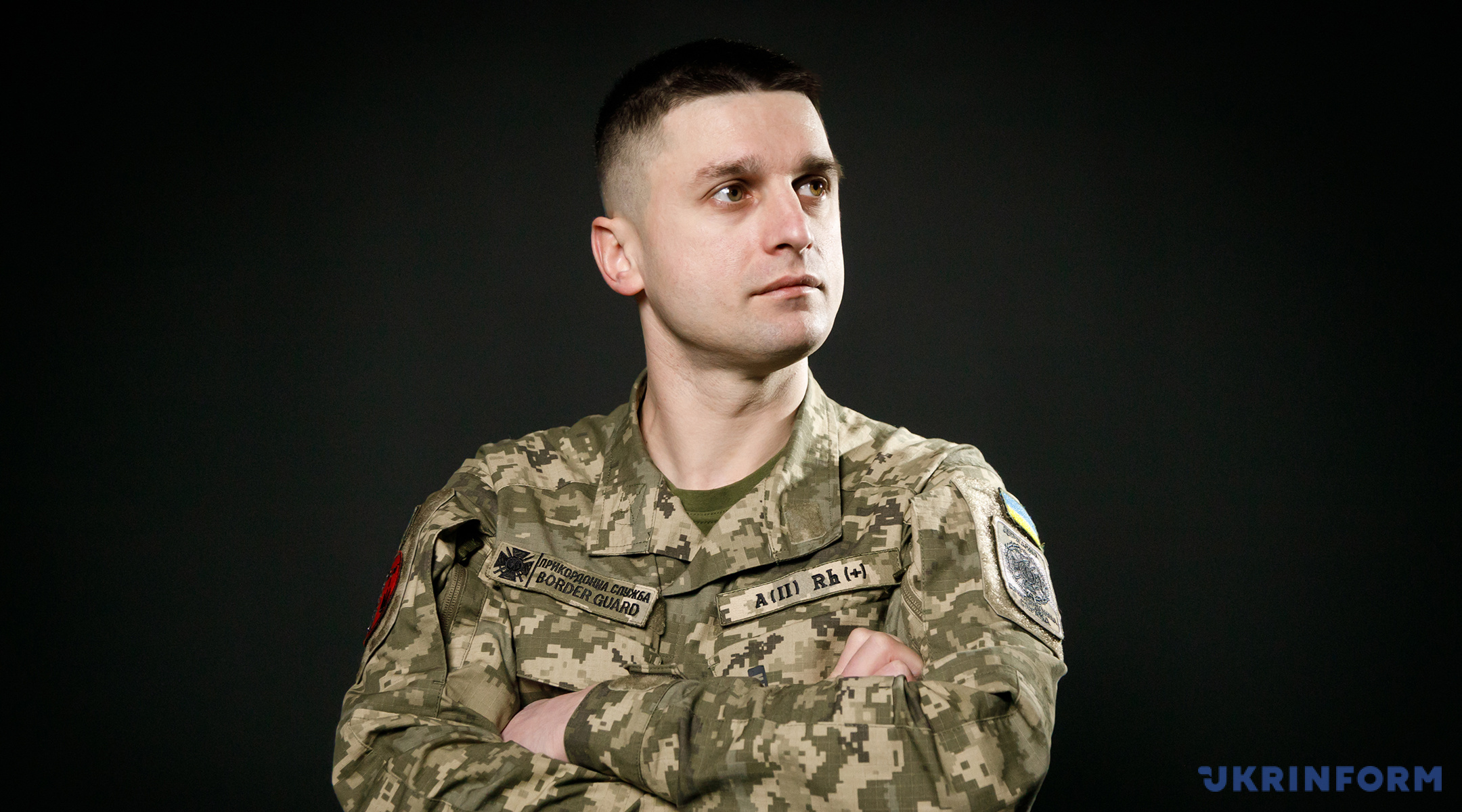
– How did you adapt to their tactics?
– Studying, and here a lot depends on different aspects, on whether the team is friendly, whether there is the respect of each other within the team, and this is what is analyzed: this guy suggested one thing to you, another one suggested another thing, you sit down together with the guys… You won’t believe it, but I planned some positions with a soldier by my side, I planned offensive or counter-offensive actions together with the soldier. If he has a good, developed, as they say, initiative, he understands the situation and can offer a very reasonable option.
– Is there anything else that impressed you about the Wagner soldiers?
– Honestly, there was nothing except what I’ve mentioned already. The Wagner brand was highly advertised, probably because their equipment is really expensive, the investment in their unit was quite big. Well, of course, their training level is higher than that of their ordinary soldiers.
– I know that at some point you found yourself encircled.
– It was a difficult story, more related to what I told about above, that we breached the circle, they encircled us again, and we needed to breach this circle again, liquidations were needed again. We were shooting, we no longer understood where to shoot, where our enemy was. There were seven of us, you look there – someone is standing there, you look over there – another one is standing, you look the other side, and, again, someone I standing there. Where to run, what to do, where to shoot? Uncertainties were everywhere, really, there were lots of them, like flies.
– What do you think helped you out of the encirclement?
– No one lost heart, no one started to snort over being encircled, no one was like, help, save us! On the contrary, everyone was cheerful, got adrenaline. A comrade of ours stepped on a nail, got his foot pierced, such a 10 centimeter long nail pierced his foot very hard. He says: I can’t feel my leg, I took a look to see that he was running with the nail still stuck in his foot, he was on adrenaline and didn’t feel it.
– Let’s summarize: what was the battle of Bakhmut like for you?
– This is my most crucial battle, and what matters for me most is to have my guys alive. Unfortunately, some of them could not be saved. And you sometimes scold yourself, but you understand that this is a war. And for me, if you sum it up, this is also a place where I learned the tactics of fighting, where I understood how to make it so that you, as a leader, give a command, an order – and people go with you and carry it out, and no one tells you: no, commander, I won’t go there. And when you learn how to deal with people, your comrades-in arms, go into battle alongside them, then people are ready for anything, really, and people understand that if a commander goes with them, he is not a fool to set a task, go doing that task and ultimately fail to get it fulfilled.
– Regarding the Ukrainian army as a whole, what lessons could be drawn from this period of war?
– Our communication should be different from what it was before, before the war in Ukraine, like, hey you, soldier, come up here, take a mop and go washing the floor… Now there should be a tolerant, educated commander who should find an approach to the soldier, and this soldier will pay back. Communication and attitude towards personnel, in my opinion, is a very important aspect in our army today.
– Now you are serving as part of the Mukachevo border guard detachment. What are your responsibilities?
— I hold a position that involves gathering information from, for example, half the Transcarpathian region regarding possible breaches of the State Border, draft evaders and, possibly, the illegal trafficking in tobacco products, analyzing this information and transmitting it to higher managerial bodies.
– What can you say about attempted illegall border crossings? Do you often have to deal with draft evaders?
– I personally don’t, but the units I cooperate with do have. The issue does exist and needs to be addressed further. I would say that these efforts are not always effective enough. A recent case: a guy went out to the mountains, intended to cross the border, called the rescue service (because when already at the mountain top, he lost orientation in the terrain, it was his first time in the area, in the forest, and there was a meter and a half of snow fall). By the time they found him in the mountains, our mountains are really very big, sadly he was already cold.
– Do you often encounter such an end to a hike in the mountains?
– Often. Even a “snowdrift” sometimes turns out to be a skeleton, half of it. Even birds would find a body that was so soaked, so softened, you know, that you needed intervention or some kind of paper documents to find out who, what and how. I don’t know why people are so scary of serving in the military. Everyone has their own fear of something, for example. There are those who evade because, I think, they are afraid that they will be killed. Well, wait, there are plenty of positions in the army, you won’t even have access to the front edge, but instead will do kitchen work, will cook. Be a driver, bring in foods or some other supplies. If you used to film weddings in your civilian life, have a gift, the inspiration for that, then get an FPV drone, get a picture, sit in a basement and neutralize the enemy. Why does everyone think that once they get there, it’s inevitable they will die?
– What would you advise those who have just been mobilized or those who are currently undergoing training, where to look for and find motivation?
– Above all else, you are fulfilling your duty, the duty of every man in our country. This is our duty – to safeguard families, safeguard the territory. The second motivation is to find your circle of communication, a friendly one, and when you see that your comrade is doing badly or his morale is undermined at some point, then you support him. And then he pulls you out of some trouble in battle, and you realize that your motivation has already grown a lot. Helping a loved one, a family member, protecting the territory is a perfect job, provided you got a smart, supportive commander. My opinion is that these are the areas where motivation should be sought and found.
– What can you never forgive?
– The death of a loved one.
– What thought do you wake up with?
– A positive one.
– Can one person change the course of history?
– Yes.
– What is your greatest fear in life?
– To die stupidly.
– What is the greatest reward for you?
– My loved ones.
– What will Ukraine’s victory signify for you?
– Just victory.
– Thank you.
Interviewed by Diana Slavinska
The interview can be watched in full here

